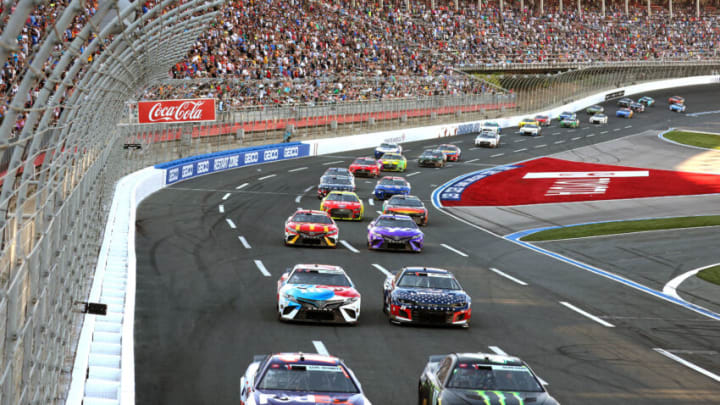NASCAR races have historically been long, grueling events that present an endurance challenge to every aspect of a race team, ranging from the driver to the car itself.
Over the last few years, however, there has been a growing movement among NASCAR drivers and fans regarding potentially shortening the distance of Cup Series races, though there are questions as to whether NASCAR doing this would be for the best.
NASCAR’s longer, endurance-based races have stood out when compared to most racing series. While some series lean toward shorter “sprints” to the finish that may only take two hours, NASCAR has done the exact opposite, with longer events which often allow for unique driver/team strategies that may not be seen in other series.
However, in recent years, there have been calls from both drivers and fans to shorten the distance of some Cup Series events, and there have already been several races that have seen their scheduled distances shrink.
In the last few years, tracks such as Atlanta, Bristol, Martinsville, and Texas have all seen at least one of their events shortened.
Atlanta and Texas have seen their races shortened from 500 miles to 400 miles, while Martinsville and Bristol have each seen one of their races shortened to 400 laps and 250 laps, respectively.
The shortening of the Martinsville race marked the first time since 1956 in which a Cup Series race at the track had a scheduled distance of under 500 laps.
The Bristol race, which was shortened to 250 laps in 2021 because it became a dirt race, became the shortest race distance-wise the Cup Series had run in almost three decades. With a race distance of 133.25 miles, it is shorter than most races on the Truck Series schedule.
A look at the 2023 Cup Series schedule quietly highlights the fact that there have already been significant changes regarding race distance. For this season, races that are 500 miles or longer are far and few between.
This season, there are only five races on the NASCAR Cup Series schedule that have a scheduled distance of 500 miles or longer.
These five events consist of the three “Crown Jewel” races, the Daytona 500, the Coca-Cola 600, and the Southern 500, along with the two Talladega races.
The 1.5-mile tracks, which have historically seen multiple races of at least 500 miles each year, only have one this year, with that being the aforementioned Coca-Cola 600 at Charlotte. Just one decade ago, the Cup Series had five races of at least 500 miles at 1.5-mile tracks.
With the race distances shortened for so many of these events, there has been an unsurprising new trend in regard to the time of races. There have already been four races this season that have been completed in under three hours.
For a series that has historically been oriented around long races that generally last around four hours, this is a far cry from the old days.
But with this comes the big question: is it really in the best interest for NASCAR?
Even if technology has improved through the years, which has largely eliminated the endurance factor on the cars themselves, the extra 100 miles that were axed ultimately could have been the difference maker between a memorable race or a race that is just an ordinary 400-mile race.
While shortening a couple races here and there may be for the better, cutting the distance of a significant number of races, including Bristol and Martinsville races which have always been extremely popular with drivers and fans alike, might not the best move for NASCAR as a whole.
Having crown jewel races and superspeedway races being the only events at 500 miles or more is almost unrecognizable for the Cup Series. There is no reason not to have at least one or two additional 500-mile events outside of those five events each year, and even if those extra 500-mile races rotate to different tracks each year, it’s something that NASCAR should consider.
For a series that has long stood apart from the rest because of longer races, shortening races across the board to try to be like the rest isn’t something that will necessarily benefit NASCAR in the long run.
